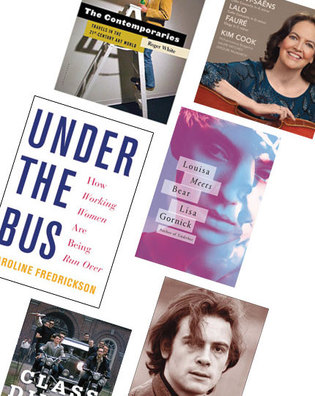 loading
loading
Arts & CultureOutputTo have your book, CD, app, or other work considered for Output, please send a copy to Arts Editor, Yale Alumni Magazine, PO Box 1905, New Haven CT 06509; or e-mail a copy or link to [email protected].  View full imagePedigree: A Memoir In this memoir of growing up in the chaos of Paris after the Occupation, French novelist and Nobelist Modiano unsparingly explores “the soil—or the dung—from which I emerged.” Polizzotti, who has translated more than 40 books, captures what he has called the author’s “surface simplicity and pitch-perfect wording” in a slim volume that introduces the recurrent themes running through Modiano’s novels.
Class Divide: Yale ’64 and the Conflicting Legacy of the Sixties The cover of Class Divide—a shot by John Boardman ’64 of his classmates on parade, some riding in a Rolls, others on motorcycles—expresses its theme: the incipient cultural and political schism in Yale and the wider world, both of them “molded by tradition yet increasingly open to winds of change.” Historian Gillette talks with politicians Joe Lieberman ’64, ’67LLB, and John Ashcroft ’64, environmentalist Gus Speth ’64, 69LLB, civil rights activist Stephen Bingham ’64, and others to explore how this “hinge generation” bridged the divide.
Saint-Saëns, Lalo, Fauré: Kim Cook
The Contemporaries: Travels in the Twenty-first Century Art World “Contemporary art is a cuttlefish,” writes painter and Yale School of Art teacher White. Or a “fungus.” Or maybe a “chimera.” In lieu of a precise definition of “a form of art philosophically concerned, perhaps even obsessed, with the idea of right now,” White offers a look at academies, art apprenticeships, regional art centers, and three notable contemporary artists—Dana Schutz, Mary Walling Blackburn, and Stephen Kaltenbach—engaged in pushing forward an endeavor in which “meaning seems to emerge from thin air, something new becomes visible, and the fun begins.”
“Over the past 100 years, America has adopted a variety of progressive laws meant to improve wages and working conditions, but these laws have left many behind,” argues Fredrickson, a longtime public interest lawyer and congressional aide. Women, especially women of color, in low-wage jobs like child care and health care have often been excluded from even the most rudimentary legal protections. Fredrickson describes how this happened, why it is growing, and how, “if we don’t fix this problem, all American workers will be swallowed by this trend.”
When the title characters meet at Princeton in 1975, one of them tells the other: “What I will most remember about you this night is how you try to smell me through the dusky drizzle.” It’s a deliciously intimate moment in a collection of interlocking short stories that are full of personal details. The stories convey the arcs of two lives, both before and after the characters meet and separate. Gornick is a trained psychotherapist, and the insights here are memorable examples of “the crown jewels”—“those moments of communion that if we’re lucky humans sometimes experience with one another.”
The comment period has expired.
|
|